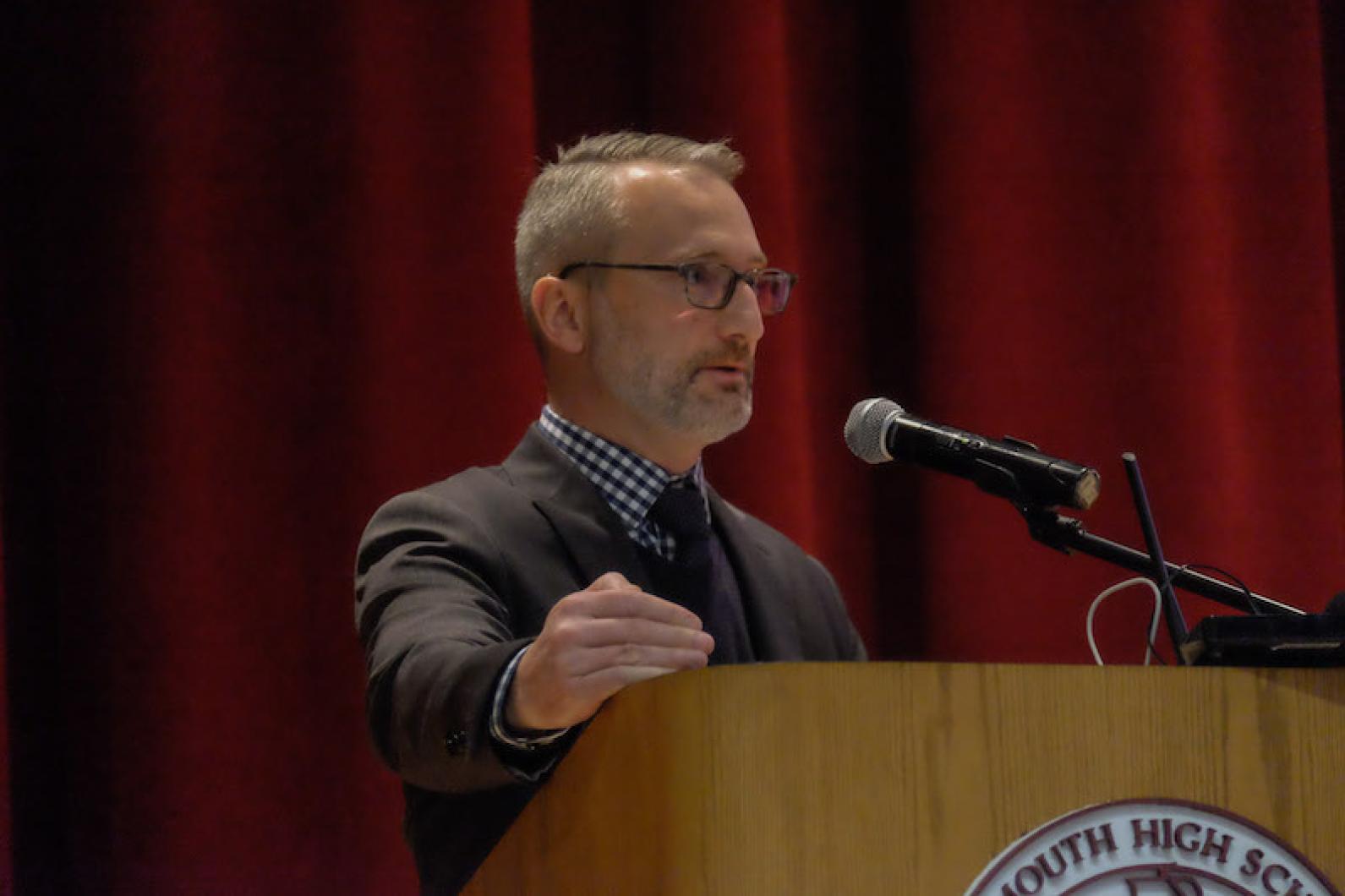The Steamship Authority needs to change its management culture or face more potentially dangerous disruptions in service, the leader of a five-month study of boat line operations told boat line governors Monday.
“[The year] 2018 was not an anomaly,” said John Sainsbury, president of Seattle-based HMS Consulting who traveled to Falmouth to present the results of his firm’s independent review at a special public meeting Monday afternoon.
About 50 people, including SSA employees, two Falmouth selectmen and nearly a dozen reporters, turned out for the presentation in the Falmouth High School auditorium. Islanders were offered transportation from Woods Hole on a Steamship Authority bus, which returned to take them to a Vineyard-bound evening boat. About a half-dozen passengers took advantage of the ride.
Commissioned after last spring’s unprecedented series of ferry breakdowns and service disruptions that led to hundreds of trip cancellations, the HMS report offers a rare and comprehensive view of the boat line’s inner workings.
Assertions that these woes were just a “perfect storm” of coincidences don’t hold up to scrutiny, Mr. Sainsbury said.
“I’m sorry to tell you that that’s not the case. That’s not the way it works,” he told the board of governors and audience.
“These things will continue to happen if [SSA managers] don’t mitigate their risk,” the consultant continued. “They need to adapt to their operating environment.”
The HMS report makes 10 recommendations for change at the Steamship Authority. Each carries the potential for major improvement, but also the freight of implementation — a significant challenge for the SSA’s fiscally lean organization, but one Mr. Sainsbury said is essential to the boat line’s success.
“I’m not sugar-coating it . . . These changes are not going to be easy,” Mr. Sainsbury said.
“They’re going to cost money. They’re going to upset people. Not everybody’s going to agree. They’re going to require resources.”
But, Mr. Sainsbury said, “there’s no half measures here.”
Early in his presentation, he took issue with a Boston-area newspaper headline about the review.
“They called it a ‘scathing report,’” Mr. Sainsbury said. “That is not the case. I’ll let you folks be the judge.” (The headline was altered Monday.)
Speaking for nearly an hour, Mr. Sainsbury showed slides to help summarize his firm’s 140-page report, which analyzed four elements: vessel operations, fleet maintenance, management structure and information technology systems.
Reporting on a fifth topic, public communications, was held up by personal problems affecting a subcontractor, Mr. Sainsbury said. A separate report on public communications will be made public in late January, he added.
Four of the five boat line governors who attended the meeting made brief comments but mostly listened to the presentation. “I was not the least bit pleased [while reading the report] but after your calm presentation I am more pleased and susceptible to your suggestions than I was while reading the report,” Barnstable governor Robert Jones said.
Vineyard governor Marc Hanover thanked the consultant for “an admirable job. I don’t agree with all of it but you’ve certainly given the board a road map.”
The report’s 10 recommendations are grouped into four areas.
Under Process-Based Management, HMS recommends instituting systems for managing safety, quality and learning. The SSA needs to consolidate its procedures and information in all three of these areas, Mr. Sainsbury said.
The boat line also needs a Vision, according to the report. This category recommends that the SSA develop a mission statement, with objectives, and a strategic plan.
Under Organizational Structure, HMS recommends adding to the engineering staff, hiring a health, safety, quality and environment (HSQE) manager and reorganizing the vessel operations staff.
The final area of recommendations, Management Recruiting and Accountability, advises adding performance objectives for SSA leaders and opening job recruitment to external candidates.
“Focus on the long term, and you’ll fix the short-term items in the process,” he advised.
Following Mr. Sainsbury’s report, governors opened the meeting to public comment. Falmouth selectman Sam Patterson, an engineer himself, took the microphone to endorse the recommendations.
“I was with a company that adopted the ISO9000 standard for quality management and what I hear being described is really just a tailored version of that larger model,” Mr. Patterson said.
“It does result in increased productivity,” he continued. “It is a top-to-bottom commitment from management all the way to people who are doing the most menial of tasks. And it is a process that you have to go through.”
It took his firm about two years to adopt the standard, Mr. Patterson said, but “we increased our productivity about 15 per cent,” while advancing quality as well.
“Most of the major corporations in this country have gone through this process,” he added.







Comments (4)
Comments
Comment policy »